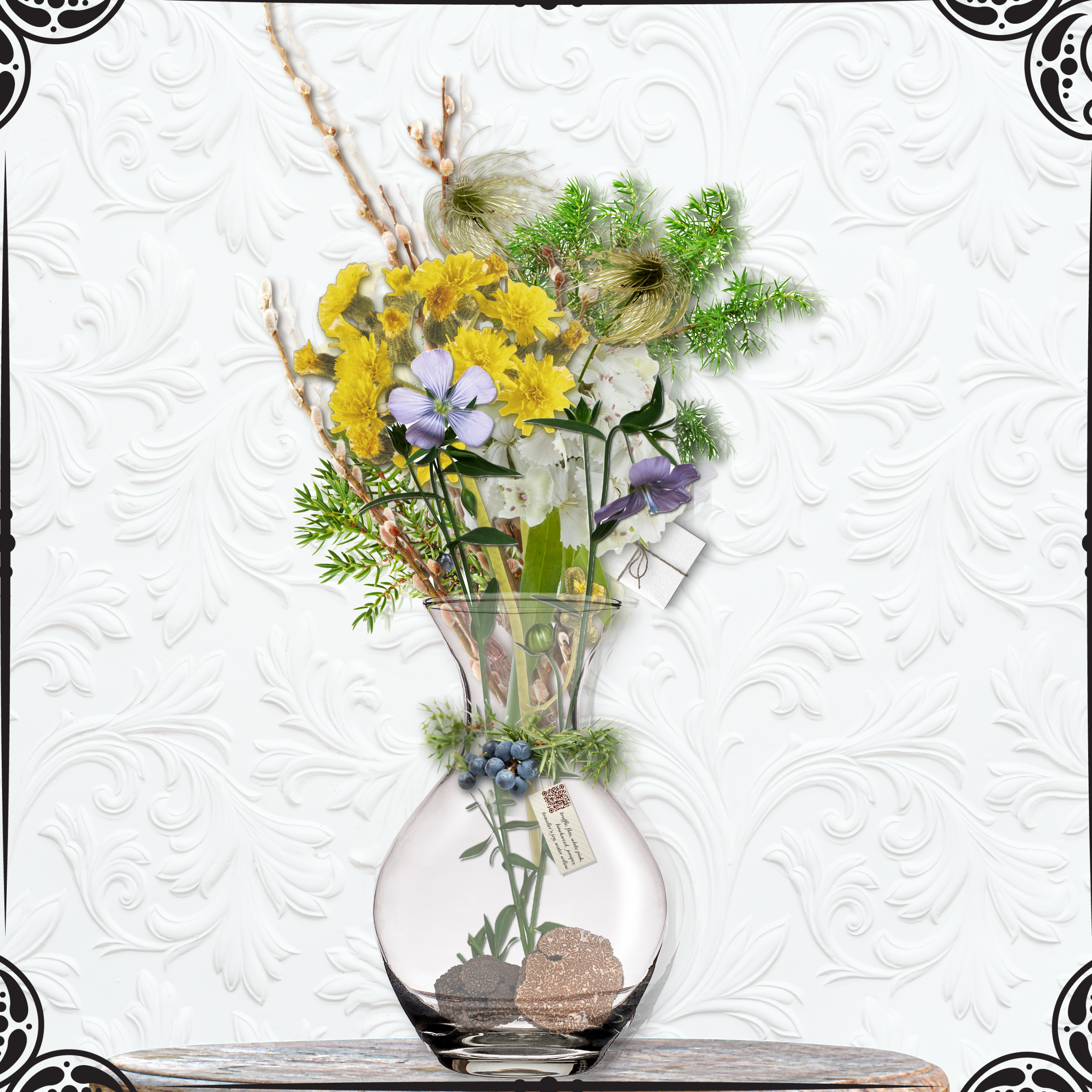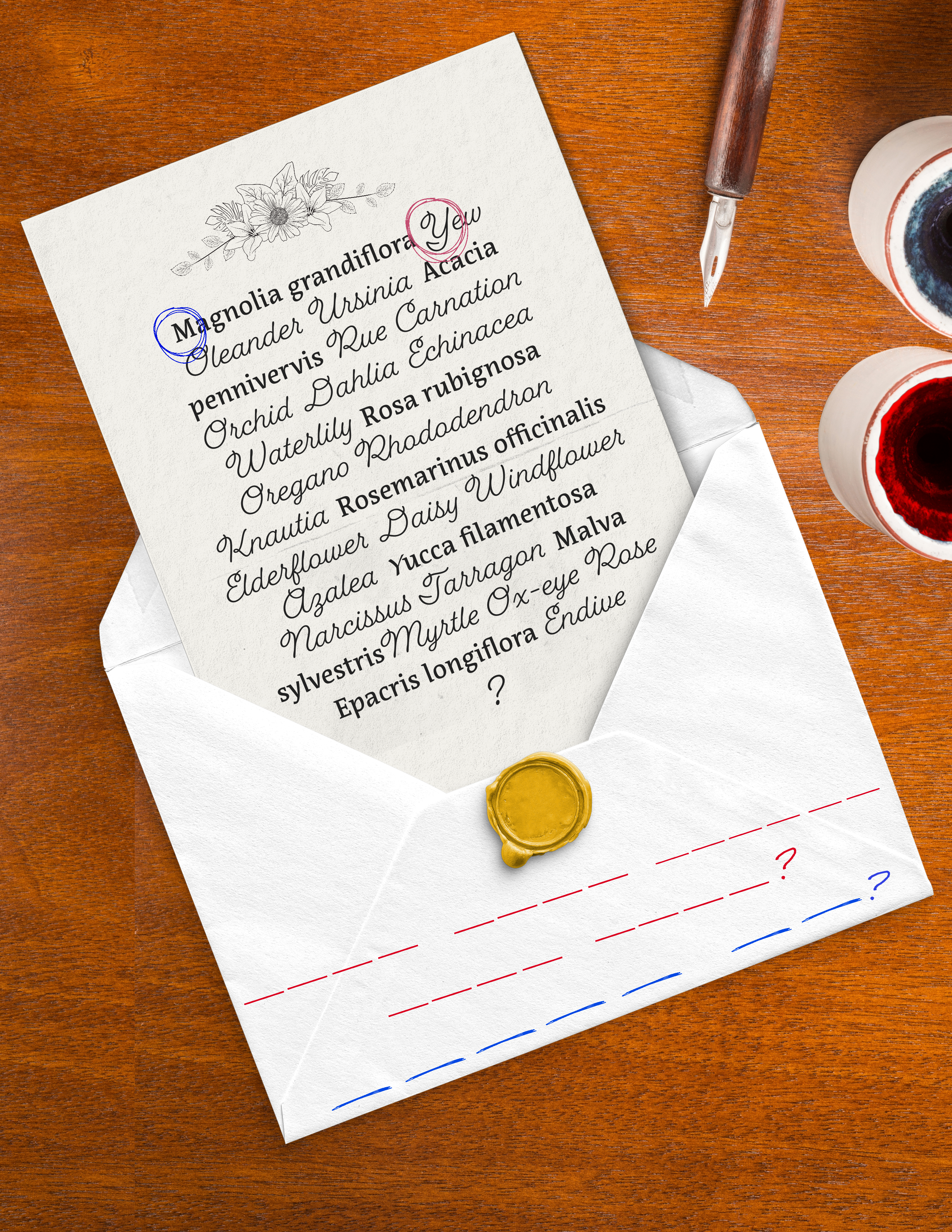
1.
The Language of Flowers
by Katherine Crighton

Miss Doyle's mother, Lady Chesterton, was annoyed to see the flowers arrive from Mr. Sayers.
There would be nothing wrong with a bouquet if he was, say, actually courting her daughter—he was a quiet gentleman, of good family and pleasant manners, who clerked in some government office to support the war effort—but she could not precisely say that he was courting her.
They had met at an Academy lecture—regarding botany, apparently—and Miss Doyle had returned that evening with an arrested expression and a renewed interest in both the household floral arrangements and the morning papers. Thereafter, Lady Chesterton had often seen Mr. Sayers at dinner parties and luncheons seek out Miss Doyle, share some brief words, hand her a small posy of flowers, and then, instead of staying by her side, go off and ignore her for the remainder of the outing. Miss Doyle would mention, distractedly, that they sometimes saw one another at further Academy lectures and, later, meetings of the rather bland-sounding Botanical Society—though who knows what they may have spoken of, if anything.
But in plainest terms: Mr. Sayers did not come for tea; he did not make himself known to Miss Doyle's father, Sir John; he did not, in short, make any appeal toward a closer connection between himself and Miss Doyle. Lady Chesterton would, in fact, have assumed them little more than acquaintances...were it not for the very odd behavior of her daughter in the last few days.
It had started with the encounter in the park over a week before. Mother and daughter had been in a carriage, taking their regular drive, when Mr. Sayers happened to pass and tip his hat. It was only after he had left again that Miss Doyle, with some agitation, asked if Lady Chesterton had marked the small bouquet he had carried. "Irises," said Miss Doyle, half to herself. "Achillea millefolia, of course, as always, but I saw champignon there as well, and was that not andromeda beneath the Carolina jasmine?"
"Possibly," said Lady Chesterton, thinking to herself that if Mr. Sayers intended that mess of a bouquet as a love token, it was perhaps better if it was going to some young lady other than her daughter.
It had been some days since that last meeting, and Miss Doyle had, in the meantime, taken to an even greater study of the reported war dispatches, extensive letter writing to other members of the Botanical Society, and somehow suborning the housekeeper into setting vases full of walnut, thyme, dock, and heartsease in front of every street-facing window of their townhouse.
So to have this bouquet from Mr. Sayers—the first Lady Chesterton had ever seen delivered from that quarter—and such an ostentatiously ugly one—was annoying to say the least.
Lady Chesterton was still deciding whether it was better to send it back with scathingly polite apologies or simply set the thing aflame when Miss Doyle, passing drearily, caught sight of it on the table.
Miss Doyle came to abrupt attention. "Is that from Mr. Sayers?"
"Well—yes," said Lady Chesterton. "But I can't think it very pleasing, and it does seem rather too forward for a mere acquaintance—"
"No, no, it's just right," said Miss Doyle, her eyes alighting on each bloom as if listing them against some hidden index. It took but a moment, but, quite suddenly, a tension Lady Chesterton had been unaware of seemed to leave her daughter's features.
This initial examination over, Miss Doyle came closer and then made a faint sound. She reached in quickly and plucked out—a letter. "That's new," she said, half wonderingly, and absconded with it to the parlor's writing desk. Lady Chesterton followed, long enough to see her daughter open the letter, review it carefully, and then—
A smile of increasing brightness was overtaking Miss Doyle's face and suffusing it with a joy Lady Chesterton had never seen before. "If you will excuse me, Mother," Miss Doyle breathed. She turned, leaving the letter where it lay in her rush to leave the room. "I must answer right away, and probably best in private."
"Answer? My dear girl, answer what?"
Miss Doyle halted in her mad dash, but only long enough to return to the letter and make a few swift marks upon the page. "This one doesn't require any sort of cipher key," she murmured. "And I think you might find these just as satisfying as myself. And certainly, Mother, you should get to know Mr. Sayers—yes, oh very much, you must come to know Mr. Sayers!"
Lady Chesterton hesitated and came closer to Miss Doyle and the parlor desk, upon which lay:

As Lady Chesterton slowly reached for the pen, she felt Miss Doyle leave her side. "Portia, what—"
"I did say I intended to write immediately," said Miss Doyle, running with unladylike haste up the stairs. "And I intend to say 'yes'—to both questions!"
Go to the next puzzle: Le Voyage de Noces
Return to the Society Archive